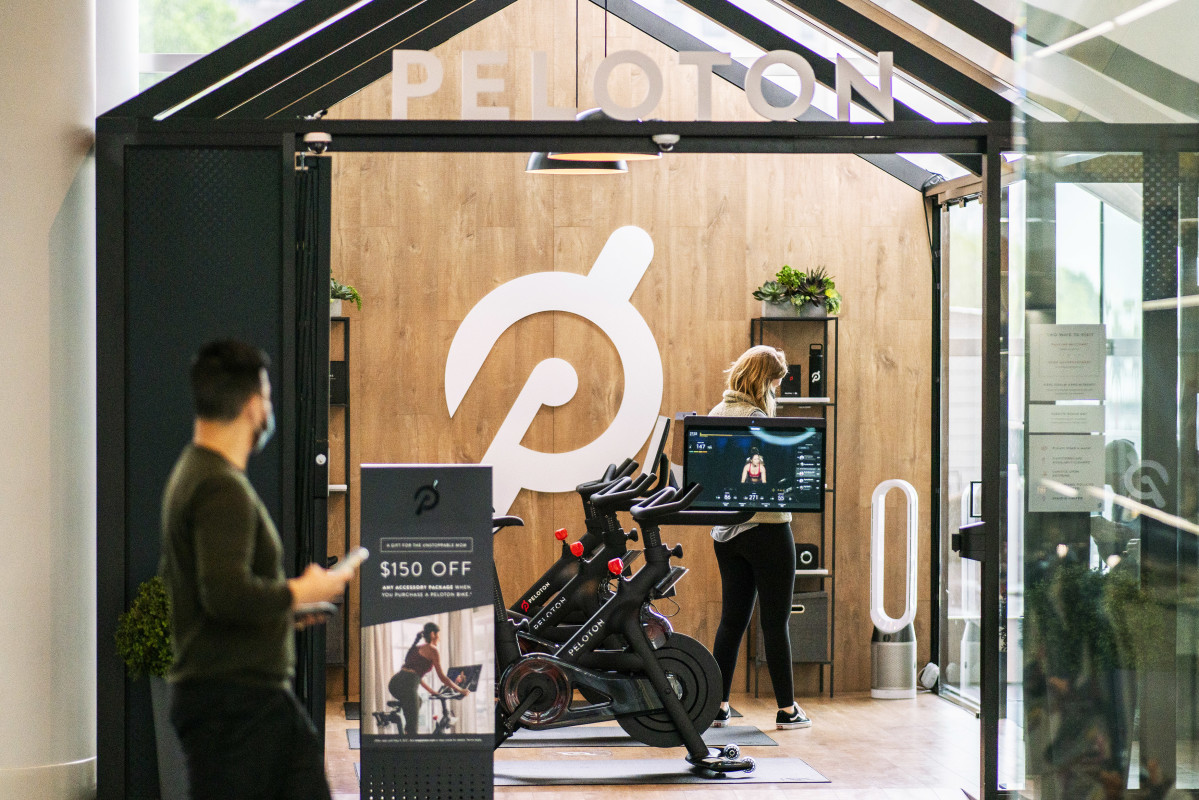Peloton struggling with a quietly growing issue
The at-home fitness company's strongest asset is slowing slipping away.

If you think how fast fashion changes, well, quickly, you probably need to take a closer look at the fitness industry.
The fitness and athletic apparel market, propelled largely by social media and celebrity influencers, changes quickly indeed.
Related: Whole Foods makes major change customers will notice right away
Think back to several decades ago. The trendy workouts, in, say, the 1980s featured a lot of spandex, bright colors, and aerobic gyms that functioned just as much as social outings.
Fast forward to the 2010s and hard core workouts, like CrossFit, were all the rage. Pair that with your best fitting pair of Nikes (NKE) and you were about as on-trend as it got.
And just a few years ago, in the 2020s, at-home workouts were all the rage. This was largely fueled by necessity; many gyms and fitness boutiques were out of operation as the Covid pandemic shuttered everything but the most essential businesses. So many of us got creative.
And at the center of many of our home offices stood 2020's crown jewel: the Peloton (PTON) bike.
Pelotons became a mainstay of our Zoom backgrounds. For the most competitive and fitness-inclined among us, it was an outlet or a way to compete with friends and neighbors without having to leave home. For others, it was simply a statement piece that functioned more as a clothing hanger than a piece of fitness equipment.
And now, just four years later, the Peloton has come crashing back down to earth, and most of us view it simply as a bike with an iPad attached to it.
Peloton has had a wild few years
That transition, which went from peak in the late 2020s to a sudden deceleration just a couple of years later, was stark.
At the height of Peloton's popularity, waiting times for a new bike, which at the time retailed for close to $2,000 for the base model, exceeded several weeks in some areas. People couldn't get enough of working out at home on something that felt like a community, and Peloton's success reflected that.
The company then announced plans to further ramp up production, bought a pricey warehouse in Ohio to scale up operations, and came out with new iterations of at home equipment, including a bike with a swivel screen, a rowing machine, a treadmill, and lots and lots of merchandise.
Related: Peloton quietly removes a free perk users loved
But these investments reflect something Peloton has long fought hard against: it's merely a hardware and equipment company. And hardware is expensive to produce and difficult to guard against competition. Lots of copycats of equal or similar quality quickly entered the market for even cheaper, and the company had no real tangible competitive edge.
Except, of course, its talent.
Peloton slowly losing what makes it special
What keeps people coming back to Peloton is its exceptional talent. Its trainers function largely as celebrity fitness personalities, offering high energy classes full of inside jokes, catchy music, and effervescent one-liners to pass the time and keep riders engaged.
Many of Peloton's most successful trainers have millions of followers on social media. It's hard to replicate that phenomenon, even at competitors. Peloton's trainers have been one of its closest guarded moats; even as it lost partners, riders, and shareholder value, the one thing it's been holding on to is its beloved trainers.
Except even that seems to be temporary. Contracts are up for negotiation at the fitness giant again, and Peloton, it seems, is finally parting ways with some of its most popular hosts.
At least three of its top loved trainers, Kristin McGee, Kendall Toole, and Ross Rayburn, have all since departed Peloton in June. Peloton shared in a statement that the departures came “during our most recent round of contract negotiations."
"As with all businesses who work with professional athletes, Instructor contracts are a normal and ongoing part of the Peloton process," Peloton said.
More Retail:
- Ulta CEO sounds the alarm on a growing problem
- Lululemon releases a first-of-its-kind product
- Target store introduces a new 'over 18' policy
- Amazon launches genius new subscription product
"During our most recent round of contract discussions, three of our beloved Instructors have chosen to leave to explore new opportunities. Each has their own special magic that has helped build the incredible Peloton community we have today; we are truly grateful and wish them all the best. Our door will always be open to them, so this is not a final goodbye, but rather, we hope to see them later. As we think about Peloton’s future, we are excited about the opportunity to bring new talent to our Instructor roster to continue offering a best-in-class experience to our Members."
Earlier this year, Peloton also quietly eliminated its free tier, which allowed members to access certain classes without charge.
Now, the two tiers available to members include:
- App One: $12.99 monthly, 3 monthly equipment classes, unlimited other (equipment-free) classes
- App+: $24 monthly, unlimited classes of all types
It's not clear where or when Peloton plans to bring in new talent, though Pelobuddy points out it may source new trainers through its recently announced partnership with Lululemon (LULU) .
"One option that Peloton could pursue is hiring some of the lululemon studio instructors who have lost their jobs. When Peloton & lululemon announced their 5 year partnership, lululemon only kept making new classes until spring 2024 – after which they are simply using Peloton classes," Pelobuddy writes.
Related: Veteran fund manager picks favorite stocks for 2024
What's Your Reaction?



























































